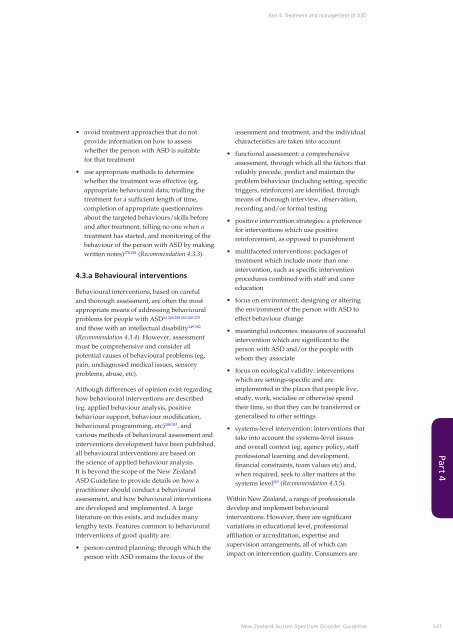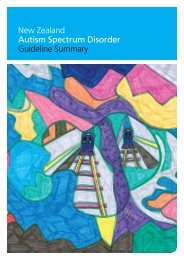New Zealand Autism Spectrum Disorder Guideline - Ministry of Health
New Zealand Autism Spectrum Disorder Guideline - Ministry of Health
New Zealand Autism Spectrum Disorder Guideline - Ministry of Health
You also want an ePaper? Increase the reach of your titles
YUMPU automatically turns print PDFs into web optimized ePapers that Google loves.
Part 4: Treatment and management <strong>of</strong> ASD<br />
• avoid treatment approaches that do not<br />
provide information on how to assess<br />
whether the person with ASD is suitable<br />
for that treatment<br />
• use appropriate methods to determine<br />
whether the treatment was effective (eg,<br />
appropriate behavioural data; trialling the<br />
treatment for a sufficient length <strong>of</strong> time,<br />
completion <strong>of</strong> appropriate questionnaires<br />
about the targeted behaviours/skills before<br />
and after treatment, telling no one when a<br />
treatment has started, and monitoring <strong>of</strong> the<br />
behaviour <strong>of</strong> the person with ASD by making<br />
written notes) 278-281 (Recommendation 4.3.3).<br />
4.3.a Behavioural interventions<br />
Behavioural interventions, based on careful<br />
and thorough assessment, are <strong>of</strong>ten the most<br />
appropriate means <strong>of</strong> addressing behavioural<br />
34 248 258 262 269 270<br />
problems for people with ASD<br />
249 282<br />
and those with an intellectual disability<br />
(Recommendation 4.3.4). However, assessment<br />
must be comprehensive and consider all<br />
potential causes <strong>of</strong> behavioural problems (eg,<br />
pain, undiagnosed medical issues, sensory<br />
problems, abuse, etc).<br />
Although differences <strong>of</strong> opinion exist regarding<br />
how behavioural interventions are described<br />
(eg, applied behaviour analysis, positive<br />
behaviour support, behaviour modification,<br />
behavioural programming, etc) 248 283 , and<br />
various methods <strong>of</strong> behavioural assessment and<br />
interventions development have been published,<br />
all behavioural interventions are based on<br />
the science <strong>of</strong> applied behaviour analysis.<br />
It is beyond the scope <strong>of</strong> the <strong>New</strong> <strong>Zealand</strong><br />
ASD <strong>Guideline</strong> to provide details on how a<br />
practitioner should conduct a behavioural<br />
assessment, and how behavioural interventions<br />
are developed and implemented. A large<br />
literature on this exists, and includes many<br />
lengthy texts. Features common to behavioural<br />
interventions <strong>of</strong> good quality are:<br />
• person-centred planning: through which the<br />
person with ASD remains the focus <strong>of</strong> the<br />
assessment and treatment, and the individual<br />
characteristics are taken into account<br />
• functional assessment: a comprehensive<br />
assessment, through which all the factors that<br />
reliably precede, predict and maintain the<br />
problem behaviour (including setting, specific<br />
triggers, reinforcers) are identified, through<br />
means <strong>of</strong> thorough interview, observation,<br />
recording and/or formal testing<br />
• positive intervention strategies: a preference<br />
for interventions which use positive<br />
reinforcement, as opposed to punishment<br />
• multifaceted interventions: packages <strong>of</strong><br />
treatment which include more than one<br />
intervention, such as specific intervention<br />
procedures combined with staff and carer<br />
education<br />
• focus on environment: designing or altering<br />
the environment <strong>of</strong> the person with ASD to<br />
effect behaviour change<br />
• meaningful outcomes: measures <strong>of</strong> successful<br />
intervention which are significant to the<br />
person with ASD and/or the people with<br />
whom they associate<br />
• focus on ecological validity: interventions<br />
which are settings-specific and are<br />
implemented in the places that people live,<br />
study, work, socialise or otherwise spend<br />
their time, so that they can be transferred or<br />
generalised to other settings<br />
• systems-level intervention: interventions that<br />
take into account the systems-level issues<br />
and overall context (eg, agency policy, staff<br />
pr<strong>of</strong>essional learning and development,<br />
financial constraints, team values etc) and,<br />
when required, seek to alter matters at the<br />
systems level 283 (Recommendation 4.3.5).<br />
Within <strong>New</strong> <strong>Zealand</strong>, a range <strong>of</strong> pr<strong>of</strong>essionals<br />
develop and implement behavioural<br />
interventions. However, there are significant<br />
variations in educational level, pr<strong>of</strong>essional<br />
affiliation or accreditation, expertise and<br />
supervision arrangements, all <strong>of</strong> which can<br />
impact on intervention quality. Consumers are<br />
Part 4<br />
<strong>New</strong> <strong>Zealand</strong> <strong>Autism</strong> <strong>Spectrum</strong> <strong>Disorder</strong> <strong>Guideline</strong> 141











